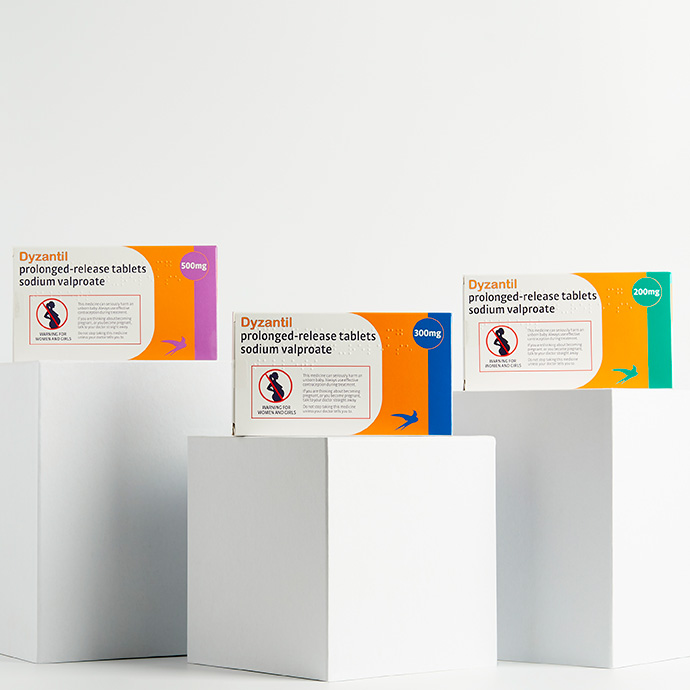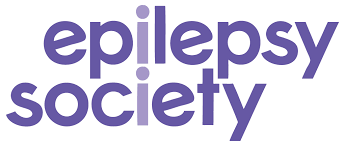THIS PAGE IS INTENDED FOR UK PATIENTS WHO HAVE BEEN PRESCRIBED DYZANTIL® (SODIUM VALPROATE)
WARNING FOR WOMEN AND GIRLS
Valproate is an effective medicine for epilepsy. This medicine can seriously harm an unborn baby. Always use effective contraception during treatment. It is important to visit your specialist to review your treatment at least once each year. Read the package leaflet carefully before using this medication. Never stop valproate without discussing with your doctor first as your condition may become worse. If you are thinking about becoming pregnant, talk to your doctor straight away. The patient guide for the pregnancy prevention programme (prevent) can be found here.
Dyzantil®▼(sodium valproate)
Prolonged-release tablets
About Dyzantil®
Summary of Product Characteristics (SmPC) and Patient Information Leaflet (PIL)
The following links will take you to the electronic Medicines Compendium (eMC) website.
By using the links below, you will leave the Pathway Portfolio website and be re-directed to an external site. Aspire Pharma is not responsible for the content on external websites.

Dyzantil® 200mg
Dyzantil® 300mg
Dyzantil® 500mg
Sodium Valproate Risk Minimisation Materials for Patients
The following links will take you to the patient guide and patient card on the electronic Medicines Compendium (eMC) website.
By using the links below, you will leave the Pathway Portfolio website and be re-directed to an external site. Aspire Pharma is not responsible for the content on external websites.
Sodium Valproate and Pregnancy
We must make you aware of the new regulations introduced by the Medicines and Healthcare products Regulatory Agency (MHRA) around the way in which the drug, sodium valproate, present within Dyzantil® (sodium valproate), is restricted in use in women and girls of childbearing age.1
Sodium valproate is associated with risks for babies exposed to the drug during pregnancy. There is a 10% risk of birth defects in newborns and a 30-40% risk of neurodevelopmental disorders, which may persist. New measures have been designed to ensure that all women who have to take the drug for their epilepsy, are fully informed of the risks, including being advised on the importance of using effective contraception and being invited for a yearly treatment review.1 Should you have any more questions, please discuss this with your doctor or pharmacist for more information.
Women and girls who are of childbearing potential must comply with the conditions of the PREVENT Programme and these include the use of effective contraception and at least annual review of treatment by a specialist. For further information about the PREVENT Programme or about Sodium Valproate, please refer to the following link: https://www.gov.uk/guidance/valproate-use-by-women-and-girls.
What is Epilepsy?
Definition
Epilepsy is a common neurological condition that affects the brain and causes frequent seizures.
Seizures can be defined as bursts of electrical activity in the brain that temporarily affect how our brain functions. Epilepsy can start at any age, but usually develops in childhood or in people over the age of 60. Epilepsy can be a lifelong condition, however, it can sometimes improve over time.2
Symptoms
Depending on the part of the brain involved, symptoms of seizures can vary, affecting people in many different ways.3
These symptoms can range from “fits”, an uncontrollable jerking and shaking, losing awareness of surroundings and staring blankly into space, odd sensations, such as a “rising” feeling in your stomach. Others include unusual senses such as smells, tastes or feeling a tingling in your arms or legs and sometimes collapsing and passing out, where you may not remember what happened.3,4
Causes
During epilepsy, the electrical signals in the brain become scrambled and there are sometimes sudden bursts of electrical activity. This is what causes seizures. It is not clear why this occurs, however, there are some possible causes. Such factors include your genetics, as around 1 in 3 people with epilepsy have a family member with it. Occasionally, epilepsy can be caused by damage to your brain, such as from a stroke, brain tumour or brain infection.2
Seizure triggers
There are some things which make seizures more likely to occur in people with epilepsy. These can be referred to as ‘triggers’. Triggers don’t cause epilepsy, but they can make seizures more likely.5 Common seizure triggers include stress, lack of sleep and alcohol.6 Other seizure triggers that have been reported by people with epilepsy include: not taking epilepsy medicine as prescribed, having an illness which causes a high temperature, periods, recreational drugs and flashing or flickering lights.5
Keeping a seizure diary, detailing when you have a seizure, what you did beforehand and how you were feeling, may help you to identify any possible triggers, as well as notice any patterns over time.5,6
Resources
By using the link below you will leave the Pathway Portfolio website and be re-directed to an external site; Aspire Pharma is not responsible for the content on external websites.
References:
- Epilepsy Society: Sodium valproate. https://epilepsysociety.org.uk/about-epilepsy/sodium-valproate (accessed June 2024)
- NHS: Epilepsy. https://www.nhs.uk/conditions/epilepsy/ (accessed June 2024)
- Epilepsy Action: Epileptic seizures explained. https://www.epilepsy.org.uk/info/seizures (accessed June 2024)
- NHS: Epilepsy symptoms. https://www.nhs.uk/conditions/epilepsy/symptoms/ (accessed June 2024)
- Epilepsy Action: Seizure triggers. https://www.epilepsy.org.uk/info/seizure-triggers (accessed June 2024)
- NHS: Living with epilepsy. https://www.nhs.uk/conditions/epilepsy/living-with/ (accessed June 2024)
XLW1010311CC1_JUN2024




